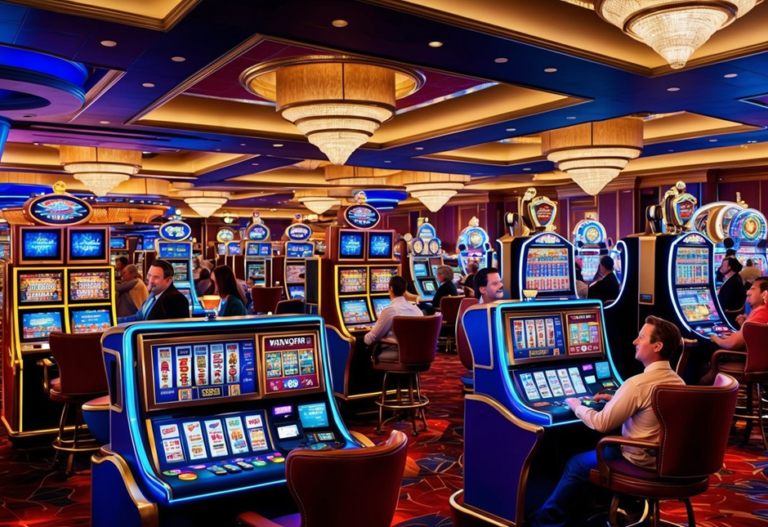The Evolution of Virtual Reality in Gaming and Entertainment
Virtual Reality (VR) has transformed gaming and entertainment by providing immersive experiences that captivate users worldwide. This article explores how VR has evolved over the years, highlighting its impact on gaming, films, music, and other entertainment sectors. Let’s dive into the fascinating journey of VR and its revolutionary influence.
Early Developments in Virtual Reality
The concept of Virtual Reality began in the 1960s with the introduction of the “Sensorama,” a device that simulated multi-sensory experiences through 3D visuals, sound, and scents. In the 1980s, Jaron Lanier coined the term “Virtual Reality” and developed foundational VR tools like the DataGlove and EyePhone. These innovations laid the groundwork for modern VR technology.
Virtual Reality in Gaming
The 1990s: The Beginning of VR Gaming
The 1990s marked the first attempts to bring VR into gaming. Nintendo’s Virtual Boy was one of the early devices aimed at delivering 3D gaming experiences. However, due to limited graphics and user discomfort, the technology failed to gain widespread acceptance.
The Early 2000s: Advancements and Setbacks
In the early 2000s, VR gaming faced significant challenges such as high costs and technical limitations. Despite these barriers, research continued, paving the way for breakthroughs in VR hardware and software.
The VR Renaissance: 2010s and Beyond
The early 2010s ushered in a new era of VR gaming with the launch of devices like the Oculus Rift and HTC Vive. These headsets provided gamers with fully immersive environments, precise motion tracking, and realistic visuals. Popular VR games like Beat Saber, Half-Life: Alyx, and Resident Evil 7 VR demonstrated the potential of VR to transform how games are played and experienced.
Virtual Reality in the Entertainment Industry
Film and Cinema
VR has opened new avenues in storytelling by introducing 360-degree films and interactive content. Viewers can now become part of the story, exploring the scenes and interacting with characters in a way that traditional films could never achieve.
Music and Concerts
The music industry has embraced VR to create virtual concerts, allowing fans to enjoy live performances from the comfort of their homes. Platforms that host VR concerts have enhanced the accessibility of live events, bringing music experiences to a global audience.
Theme Parks and Museums
Theme parks and museums have integrated VR into their attractions to deliver unforgettable experiences. Virtual reality rides and exhibits bring stories to life, offering interactive and educational content for visitors of all ages.
The Impact of VR on User Engagement
VR’s ability to immerse users in virtual environments has redefined engagement in gaming and entertainment. In gaming, players can interact with their surroundings and characters in real-time, making the experience more lifelike. In entertainment, VR allows creators to connect deeply with audiences by offering innovative ways to consume and interact with content.
Challenges in Virtual Reality
Despite its advancements, VR still faces challenges that hinder its widespread adoption:
- Cost: High costs of VR headsets and accessories make it inaccessible for many users.
- Motion Sickness: Some users experience discomfort during prolonged VR sessions.
- Technical Limitations: The need for powerful hardware and high-quality content continues to challenge developers.
Overcoming these hurdles will be crucial for VR to become a mainstream technology in gaming and entertainment.
Read more about : https://ztech100.com/
The Future of VR in Gaming and Entertainment
The future of VR looks promising as technology continues to advance. Affordable headsets, improved visuals, and better motion tracking are making VR more accessible. The entertainment industry is exploring new ways to integrate VR into everyday experiences, from live events to virtual theme parks. With increasing investments and innovations, VR is expected to become a dominant force in gaming and entertainment in the coming years.
In conclusion, the evolution of virtual reality in gaming and entertainment has been remarkable, transforming how we engage with digital content. From humble beginnings to revolutionary advancements, VR has created immersive experiences that captivate users. Much like the benefits of using a filler machine in streamlining production processes, VR technology continuously evolves to enhance efficiency and user satisfaction. As technology improves, the possibilities for VR are limitless, promising an exciting future for gaming and entertainment enthusiasts alike.





